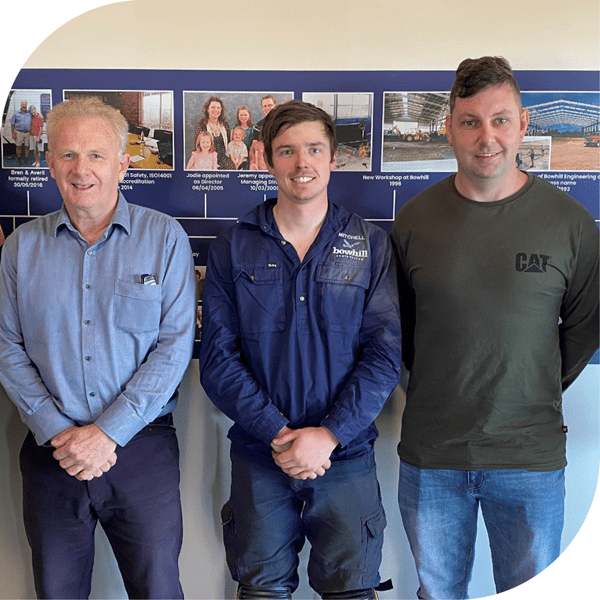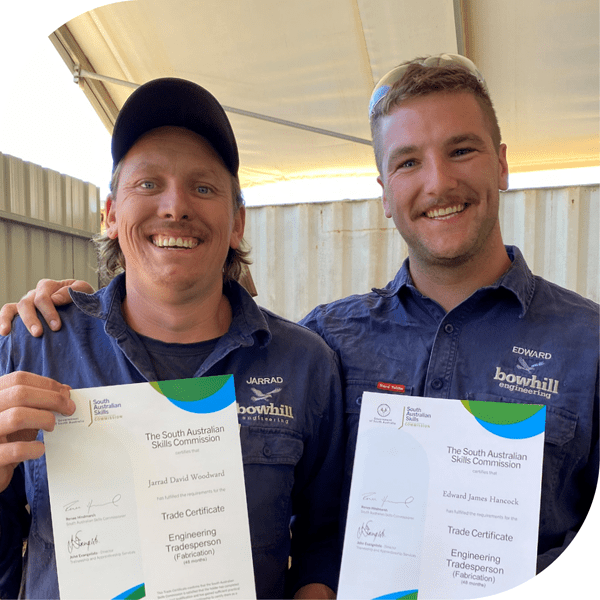Carrying on from what Sam has said I would like to welcome all of the new employees to the Boweng team. It has been great to be involved in your progression into the business and I look forward to working closely with you and helping you in any way I can moving forward.
Whilst welcoming these guys today, I thought it would be a great opportunity to have a quick talk about some of the things we do as a business to offer support to apprentices and mention some points around things we can all do to ensure our apprentices feel safe at work with a focus on apprentice wellbeing and workplace behavior.
Before I do this, I just want to say that I feel we are very lucky on both sides of the fence in the ability to ensure apprentice safety and success. We have a great bunch of apprentices who are willing to listen and learn and we have personable and patient tradesmen that are willing to pass on their skills and knowledge. This should not be underrated, and it is very rare that a business can successfully function let alone exceed expectations as consistently as we do with such a high apprentice v tradesman ratio.

As a business we are required to provide a safe work environment, safe plant and structures, safe systems of work, adequate facilities to support the welfare of workers, information, training, instruction, and supervision and provide continuous monitoring of workers health and workplace condition to prevent illness or injury.
We endeavor to make this happen by ensuring new employees receive effective induction, training, and information which includes health and safety policies, the hazards and risks specific to their role, SOPS, emergency procedures, first aiders and HSRs in the workplace, incident, and hazard reporting procedures. I am endeavoring to ensure these are effective and would love to hear any feedback as to how we can improve these.
In addition to the induction and training process you all can have a big impact on how an apprentice starts and works throughout their apprenticeships and continues through the business. What an apprentice or new worker sees and is shown in the early stages becomes the normal and a habit very quickly. Ensure you set the example by following safe working procedures and policies, by not using faulty equipment or taking shortcuts, identify and report hazards and incidents as you see any. This will form good habits that keep everyone safe.
As most of you would be aware, recently we have implemented an apprentice supervision checklist for all tradesmen which gives some great insight into an apprentice’s world and hopefully gives some helpful hints and tips on what is effective and what is not when supervising apprentices. Any feedback on this?
There are a lot of forums where our employees can voice their opinions, concerns etc. part of these is providing our apprentices with a weekly check in that creates that extra place for them to bring anything up they may not feel comfortable talking about in other forums. They have an Apprentice Team Leader and me in on these meetings as a point of call for support whenever required. I have thoroughly enjoyed being part of this and forming relationships and trust with our apprentices has been a highlight. We have also built apprentice checklists that are there for apprentices to use to form good safety and quality habits and I have been really impressed with the input and attitude towards these from our guys.


I feel that workplace behaviour is one of the most important health and safety matters and I feel ensuring that this behaviour is acceptable goes a very long way to contributing to an apprentice’s experience and success. Young workers, particularly those starting a job for the first time, are usually unaware of how to deal with bullying, discrimination, and other inappropriate behaviour. Apprentices are out to impress and don’t want to make any waves and might be reluctant to speak up until it’s too late. What I am trying to get at here is everyone loves a laugh at work (me included), but we need to be mindful that what is acceptable to one person may not be to another and identifying this is crucial especially when you are talking about young apprentice workers. On the flip side of this if you notice a new worker struggling, being the one to check in can have a real positive impact on that worker to know they have someone that is looking out for them and someone they can go to if required.
In finishing I would like to reiterate I feel we already do an amazing job of offering support to our apprentices, and this shows with how our apprentices continually perform beyond expectations. We are very lucky to have the positive work environment and culture we do and let’s continue to work together to build on this and most importantly keep everyone safe.













